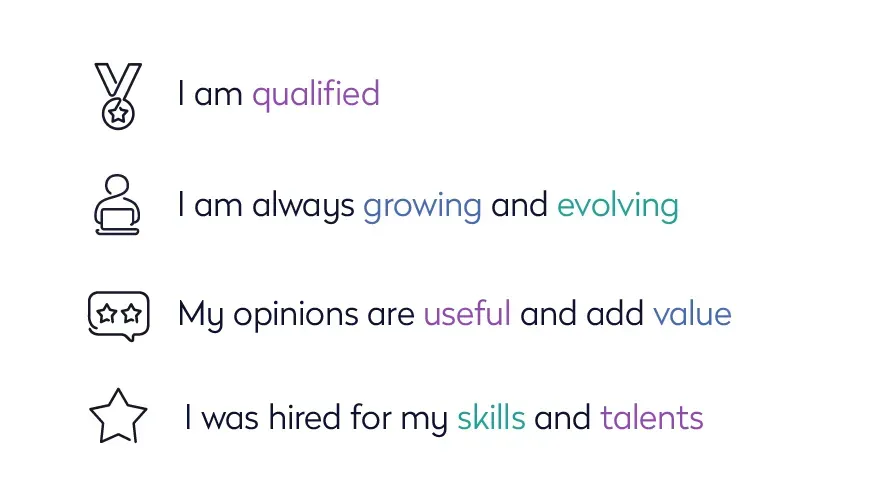
Do you feel self-doubt when it comes to your work? Or experience feelings of phoniness – like you’re a fraud – and often wonder if you even deserve your job? If yes, you aren’t alone.

Imposter syndrome in the workplace is a real thing. The truth is, whether you know it or not, most of your coworkers feel the same way.
82% of people deal with imposter syndrome at work. An employee’s talent and success aren’t enough to eliminate feeling like an imposter. In fact, 70% of successful professionals said they felt like imposters at some point in their careers.
What is imposter syndrome in the workplace?
The imposter syndrome, also known as the imposter phenomenon or imposter experience, refers to self-doubt about our work accomplishments. We may feel like imposters when we believe we don’t deserve our jobs and success. Consequently, we feel like a fraud in the workplace.
The Imposter Phenomenon was first identified in the late 1970s. This term was coined by researchers Pauline Clance and Suzanna Imes in their study. The study was entitled “The Imposter Phenomenon in High Achieving Women: Dynamics and Therapeutic Intervention.”
The term “impostor phenomenon” is used to describe an intense feeling of being an intellectual phony. It is especially common among high-achieving women.
Initial research concentrated on women with PhDs in different areas. Subsequent studies, however, showed that male professionals also experienced imposter syndrome. A recent study found that 90% of women and 80% of men experience imposter syndrome.
Carolyn Herfurth is the co-founder of the Imposter Syndrome Institute. She explains that Imposter Syndrome is a belief held by millions of people globally. They feel they are not as talented, intelligent, capable, or qualified as others think they are.
The fascinating thing is that these feelings exist despite all the evidence of our accomplishments. This evidence includes diplomas, awards, business growth, and promotion.
Common signs of imposter syndrome
Though imposter syndrome is far from new, it is gaining much more traction as of late. Professionals now identify what it is and its most common signs.
You’re most likely experiencing the imposter phenomenon if you:
- Overwork – working earlier and later than what is required of you to prove to yourself that you’re enough
- Blame and criticize yourself for minor mistakes often
- Feel like a fraud who is fooling your boss and colleagues – constantly in fear you will be exposed
- Believe your coworkers are more organized and in control than you are
- Downplay your knowledge, abilities, and skills
- Can’t accept praise because you feel your work is not good enough – even if others express it’s great
- See the world in terms of extremes – you’re either the best or the worst
- Tend to be a people pleaser – focusing more on what others want than what you feel would be best
One of imposter syndrome’s most notable symptoms is intrusive thoughts. 25% of professionals believe their success is based solely on luck. 19% think their boss or coworkers will discover they are “underqualified.” 15% feel they only got the job as there were few other candidates.
Ironically, the more successful people are, the more prone they are to feel like an imposter.
What causes imposter syndrome
Imposter syndrome is most common when employees try something new and feel pressured to prove themselves. But what are the underlying reasons for this need to be successful?
Some main triggers for imposter syndrome include:
- Family messages and expectations – how different families have different expectations of their children
- Confidence gaps between genders – Men tend to have more confidence earlier in life, while women have more confidence later in life
- A lack of diversity – Lack of representation in the workplace can poorly affect an employee’s workplace experience
- Existing mental health symptoms – anxiety and depression in our personal lives can often bleed into our professional lives
That said, imposter syndrome is not always an employee issue. In some cases, it is driven by company culture and work environment. For example, workplaces that don’t promote acceptance and positive reinforcement are more likely to have employees suffer from imposter syndrome.
Professionals with imposter syndrome may have difficulty accepting positive feedback. They may view it as an exaggeration of their abilities, rather than an accurate assessment. If employees don’t receive enough positive feedback in the first place, they are even more prone to beat themselves down.
People with imposter syndrome are unable to internalize success, which is very damaging to self-worth. If you struggle with this, identify your leading cause, as it may differ from your coworkers. Next, learn the type of imposter syndrome you suffer.
Types of imposter syndrome
The cause of imposter syndrome varies. Therefore, the type of imposter syndrome employees experience is not uniform.
In her book Why Capable People Suffer from the Imposter Syndrome and How to Thrive in Spite of It, Dr. Valerie Young, co-founder of the Imposter Syndrome Institute, categorized people who experience imposter syndrome into five main types.
The perfectionist
These are high performers who pride themselves on producing the highest caliber of work. They tend to micromanage and have a hard time delegating. The perfectionist must do things themselves. They have a fear that if they are not involved, the task will not be done correctly.
The natural genius
This employee has genetics on their side. They are naturally smart and talented but have difficulty facing challenges outside of their expertise because it makes them feel stupid. They feel that finishing a task quickly is a sign of one’s competence.
The expert
These kinds of professionals feel like they’ve tricked their way into their position and that they don’t deserve it. They believe they should know everything, so when mistakes – no matter how minor – they experience shame and fear of failure.
The soloist
They think they should do everything on their own and believe that asking for help indicates failure. They take pride in shouldering the company’s responsibility. Asking for help would make them appear inept, so they avoid it.
The superhuman
This is a person with a can-do attitude who is prone to pushing themselves to their limits. These kinds of people feel the need to prove themselves and feel like they constantly need to earn their stripes. These employees focus on how many roles they can juggle and be successful in.
If you have imposter syndrome but are still not sure which type you are, take the 5 types of imposter syndrome test to help you find out.
Affirmations to overcome imposter syndrome
Imposter syndrome is the persistent voice in your head that undermines your abilities at work. However, it’s essential to remember that we have control over the volume, stop, and play buttons of these voices. One effective method to overcome imposter syndrome is to be mindful of our thoughts and choose them wisely. Affirmations can be a powerful tool to overcome and conquer imposter syndrome.
Positive words can recreate your reality. Studies prove that positive affirmations help activate brain parts associated with self-related processing and reward. These same studies also indicate that positive affirmations can help build or restore self-competence.
The concept of self-affirmation isn’t by any means complex or far-fetched. Positive affirmations are simply states or phrases that, when repeated daily, can help challenge negative thoughts and boost self-confidence. Below are some affirmations you can use to beat imposter syndrome:
I am qualified.
Rather than “I’m fake,” remind yourself that you are qualified. Leadership takes time to review resumes and pick candidates to interview who have the right qualifications for the position. Then, you were hand selected from that pool of professionals due to the capabilities you bring to the table.
I am always growing and evolving.
It takes time to learn a new job and/or industry. However, if employees don’t pick up on the job immediately, they believe they aren’t smart enough to be there.
This can’t be further from the truth. Remember that you are constantly growing and evolving, just like your colleagues and managers. Give yourself the time to learn new skills without beating yourself up for not doing it quickly enough.
My opinions are useful and add value.
In the workplace, it’s common for professionals to compare themselves to their coworkers. However, as the saying goes, “comparison is the thief of joy.” When you compare yourself to colleagues who have more experience or are at a more advanced stage in their careers, it’s easy to believe that your voice doesn’t hold the same significance as theirs.
That is entirely untrue. You were hired because your opinions are useful and add value to the team. Everyone is different. Your own experience and expertise are as valuable as your teammates.
I was hired for my skills and talents.
Don’t think that you don’t belong in your job or at your company. You do! You went through an entire hiring process to get your job. If management believes your skills and talents are worth you getting hired, then you have no reason to doubt it.
Remember, you didn’t get hired by mistake. You were chosen not only for your professional background but your unique perspective.
There is power in words, especially the ones you use toward yourself. So the next time you feel like an imposter and don’t belong, tell yourself otherwise. Then tell yourself again and again until you begin to believe it. You are a huge asset in your workplace.
Ready to trust yourself?
Imposter syndrome is a thief. It steals your self-esteem, sense of accomplishment, and willingness to take risks, replacing them with anxiety, limiting beliefs, and fear about what’s next.
No matter which type of imposter syndrome you have, challenge your self-sabotaging beliefs. Talk to yourself like you would your best friend, with compassion and encouragement. Use positive affirmations to help move you in the right direction.
Consider them a part of your morning work routine. Lastly, be patient with yourself. Affirmations don’t work overnight, but when you do them enough, your brain will begin to listen to what your mouth says. Trust yourself and own your words as they bring you away from negativity and towards optimism.








